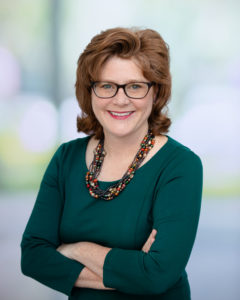By Amy Carr, Owner of Amy Carr Communications

Amy Carr is the owner of Amy Carr Communications, a firm that specializes in strategy, public relations and digital marketing with measurable results. Amy is a past president of Women Communicators of Austin (2002-2003). When she’s not advising clients, you’ll find her digging in the garden, walking her dog Gizmo and spending time with her husband and teen daughter.
Words are important. Words are the medium for connecting with one another and sharing what is meaningful to us.
For communicators, words and their sentiment are our life’s work. Each of us are in the business, one way or another, of giving voice to our work, our clients, the media and organizations of every size. We can’t really afford to get the words wrong. Too much is at stake.
To answer the call for the latest advice on inclusive language, Women Communicators of Austin invited Diversity and Inclusion Language Consultant Camellia Falcon, PMP, owner of Codices Consulting, to speak at April’s WCA@Lunch. She shared how language can be misused despite inclusive intentions and how to carefully choose language that will represent you and your organization appropriately.
The hour-long talk and discussion was moderated by Anne Lasseigne Tiedt, WCA’s VP of Programs, and produced by President Andrea Exter. The topic complements WCA’s commitment to Diversity, Equity and Inclusion, which was a focus in the 2020-2021 board year.
The following three takeaways will help you communicate with confidence in 2021 and beyond.
What are the risks of not learning about updated language?
Many of us could relate to the words one attendee shared: “Diversity and inclusion is more difficult every day!” No one wants to offend or leave someone out. We all recognize that outdated language can cause hard feelings and needless distractions, which dilute or distract from the original, intended message.
“You want your message to be the focus,” says Camellia Falcon. “A lot of times when we unintentionally use words that are now outdated or have taken on a new meaning, people who are hearing your message will start to focus on that rather than the message you are trying to convey.”
Consider the Burger King advertising campaign launched on International Women’s Day with the headline: “Women Belong in the Kitchen.” The campaign intended to raise awareness of a scholarship program for female chefs. Instead, a firestorm on social media ensued, inspiring a local woman-owned Austin agency, Hunt. Gather., to create their own campaign-inspired merchandise in response to raise funds for Girls Empowerment Network.

Camellia Falcon, PMP, owner of Codices Consulting.
How does language become non-inclusive?
Language can change over time, taking on new meanings, and the historical context of idioms and phrases can be forgotten or not carefully considered. Even as expectations are higher and landmines seem to be everywhere, leading with new common practices can help us navigate cultural shifts more deftly.
-
Ignoring the Historical Context: Many times with idioms and sayings, the historical context can be lost over time or become quite different. “Circling the wagons” is an example of an idiom that has taken on a different meaning over time and can be off-putting to Native Americans.
-
Not Considering Inclusivity: LGBTQIA and those who are nonbinary can raise questions about which pronouns to use. More people are sharing their preferred pronouns in their signature line, and some are using “they” in place of “she/he” to be more inclusive. In terms of legal documents which require precise language, one respondent shared that they used a disclaimer to explain that their use of “they” was used to include nonbinary people.
-
Not Showing Respect for Someone’s Wishes: We can ask someone how they would prefer to be addressed. When in doubt, asking is always preferable to not addressing a situation head on. Would they like to be referred to with the honorific Ms. or Mrs. for example?
-
Continuing to Use Old Language: Consider the Indianapolis Museum of Art which faced controversy for its job posting which sought a “director who would maintain the museum’s “traditional, core, white art audience.” This situation illustrates the dangers of not updating language across the organization—from the marketing department to human resources.
Why is language offensive and how do we address it?
Outside of curse words, language can be offensive in a variety of ways, including excluding certain groups, continuing harmful stereotypes and silencing groups with different opinions. This larger issue speaks to the structural foundations that the anti-racism movement is endeavoring to unravel.
When language is not inclusive, it can be offensive. Language can be used to diminish a person’s standing or position. It’s why you may have noticed that more job postings use gender-neutral language.
When language is culturally appropriated, it is used without considering the context. It might continue racial stereotypes or use a word or phrase that does not respect the original meaning of the word. Often you’ll see these in uses of words from indigenous and other cultures (i.e., pow-wow, mecca, tribe and spirit animal).
When language has a history of oppression, it can be problematic. People are rethinking the use of the word “crazy” as demeaning to those with a history of mental illness. Consider the usage of idioms and metaphors carefully. “Yanking someone’s chain” has a complicated history and could evoke the concept of chain gangs from history.
When language reflects power dynamics, it can also be perceived poorly. This can happen on websites discussing charitable giving, says Falcon. For example, the technology sector has reckoned with the use of master/slave wording in programming code.
How do we make language more inclusive to those around us?
Language is evolving and its history may not be clear to us at first. But that’s not a reason to stay on the sidelines. Falcon recommends correcting gently without implying fault. “I know you didn’t mean it this way, but I prefer you use the term X.”
Alternately, share your own journey so you can give context as to why you prefer a certain term over another. She remarks, “I am trying to stop saying…the word ‘hate’ because it is a word that leads to so much more. Instead I can say, ‘That disgusts me or I despise that..’” Suggesting an alternate phrase can help someone say what they mean more precisely.
It will take practice getting comfortable with correcting yourself and others. “There is no shame in correcting yourself,” Falcon says. Respect requests made by others, and “Try not to be flustered; think of it as a name change.”
“Right now is the most confusing time we have had in a while. The reason for that is because anti-racism is being considered in our popular culture,” explains Falcon. “…I think right now we are working really hard to get these terms right and then I think it will normalize and will be part of our standard lexicon.”
Falcon concluded her talk advising attendees to take responsibility for language they use and is used around them. It doesn’t matter if it is directed at us or someone else, but there is an impact.
You can reach Camellia Falcon, PMP at cfalcon@codicesconsulting.com or connect with her on LinkedIn.
ABOUT THE AUTHOR
Amy Carr is the owner of Amy Carr Communications, a firm that specializes in strategy, public relations and digital marketing with measurable results. Amy is a past president of Women Communicators of Austin (2002-2003). When she’s not advising clients, you’ll find her digging in the garden, walking her dog Gizmo and spending time with her husband and teen daughter.
- In Memoriam: Pam Baggett-Wallis - February 5, 2024
- Anne Lasseigne Tiedt, APR - January 6, 2024
- Cindy Friedman - December 6, 2023

